BSBLDR511 Develop Emotional Intelligence: Assessment Tasks Guide
VerifiedAdded on 2023/06/03
|46
|12143
|193
Homework Assignment
AI Summary
This document comprises a series of assessment tasks for the BSBLDR511 unit, focusing on developing and utilizing emotional intelligence, as part of the Southern Cross School of Business curriculum. It includes three main assessment components: written questions designed to test understanding of emotional intelligence concepts, an emotional intelligence self-assessment project aimed at enhancing personal awareness and development, and a staff emotional intelligence project involving case study analysis and role-play scenarios to demonstrate practical application in a workplace setting. The assessment plan provides an overview of each task, detailing the requirements, resources needed, and submission guidelines, ensuring students are well-prepared to demonstrate competency in emotional intelligence.
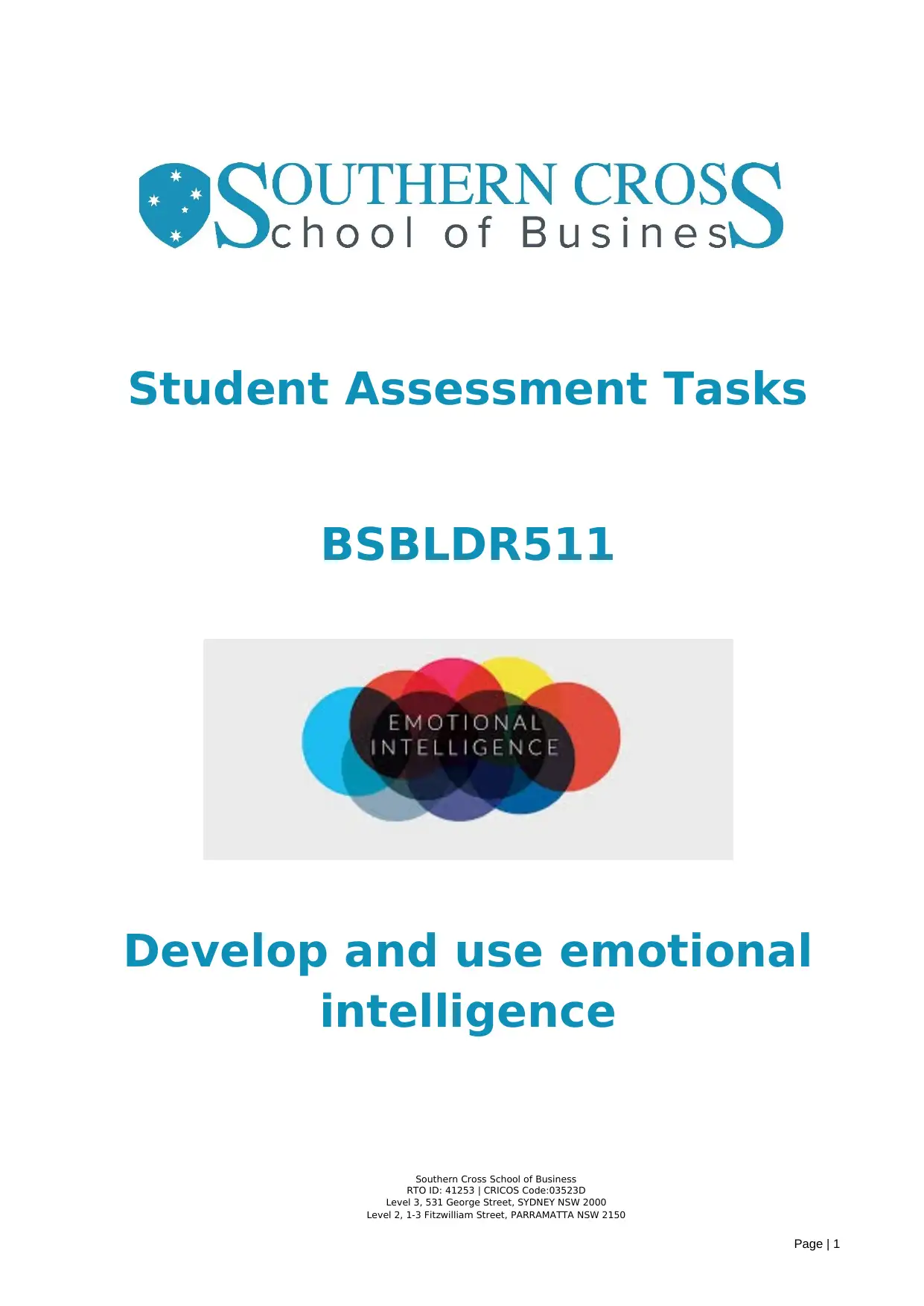
Student Assessment Tasks
BSBLDR511
Develop and use emotional
intelligence
Southern Cross School of Business
RTO ID: 41253 | CRICOS Code:03523D
Level 3, 531 George Street, SYDNEY NSW 2000
Level 2, 1-3 Fitzwilliam Street, PARRAMATTA NSW 2150
Page | 1
BSBLDR511
Develop and use emotional
intelligence
Southern Cross School of Business
RTO ID: 41253 | CRICOS Code:03523D
Level 3, 531 George Street, SYDNEY NSW 2000
Level 2, 1-3 Fitzwilliam Street, PARRAMATTA NSW 2150
Page | 1
Paraphrase This Document
Need a fresh take? Get an instant paraphrase of this document with our AI Paraphraser
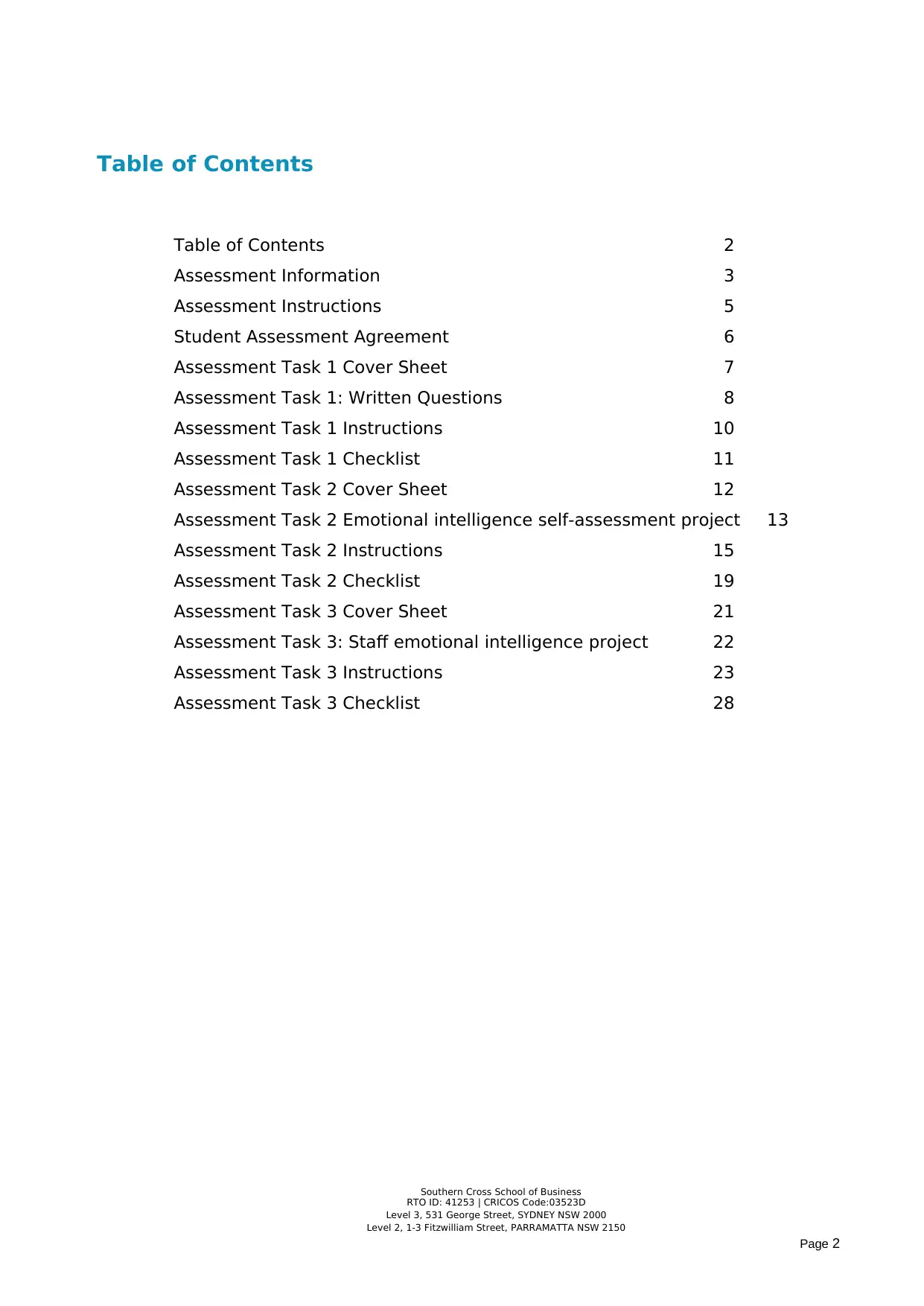
Table of Contents
Table of Contents 2
Assessment Information 3
Assessment Instructions 5
Student Assessment Agreement 6
Assessment Task 1 Cover Sheet 7
Assessment Task 1: Written Questions 8
Assessment Task 1 Instructions 10
Assessment Task 1 Checklist 11
Assessment Task 2 Cover Sheet 12
Assessment Task 2 Emotional intelligence self-assessment project 13
Assessment Task 2 Instructions 15
Assessment Task 2 Checklist 19
Assessment Task 3 Cover Sheet 21
Assessment Task 3: Staff emotional intelligence project 22
Assessment Task 3 Instructions 23
Assessment Task 3 Checklist 28
Southern Cross School of Business
RTO ID: 41253 | CRICOS Code:03523D
Level 3, 531 George Street, SYDNEY NSW 2000
Level 2, 1-3 Fitzwilliam Street, PARRAMATTA NSW 2150
Page 2
Table of Contents 2
Assessment Information 3
Assessment Instructions 5
Student Assessment Agreement 6
Assessment Task 1 Cover Sheet 7
Assessment Task 1: Written Questions 8
Assessment Task 1 Instructions 10
Assessment Task 1 Checklist 11
Assessment Task 2 Cover Sheet 12
Assessment Task 2 Emotional intelligence self-assessment project 13
Assessment Task 2 Instructions 15
Assessment Task 2 Checklist 19
Assessment Task 3 Cover Sheet 21
Assessment Task 3: Staff emotional intelligence project 22
Assessment Task 3 Instructions 23
Assessment Task 3 Checklist 28
Southern Cross School of Business
RTO ID: 41253 | CRICOS Code:03523D
Level 3, 531 George Street, SYDNEY NSW 2000
Level 2, 1-3 Fitzwilliam Street, PARRAMATTA NSW 2150
Page 2
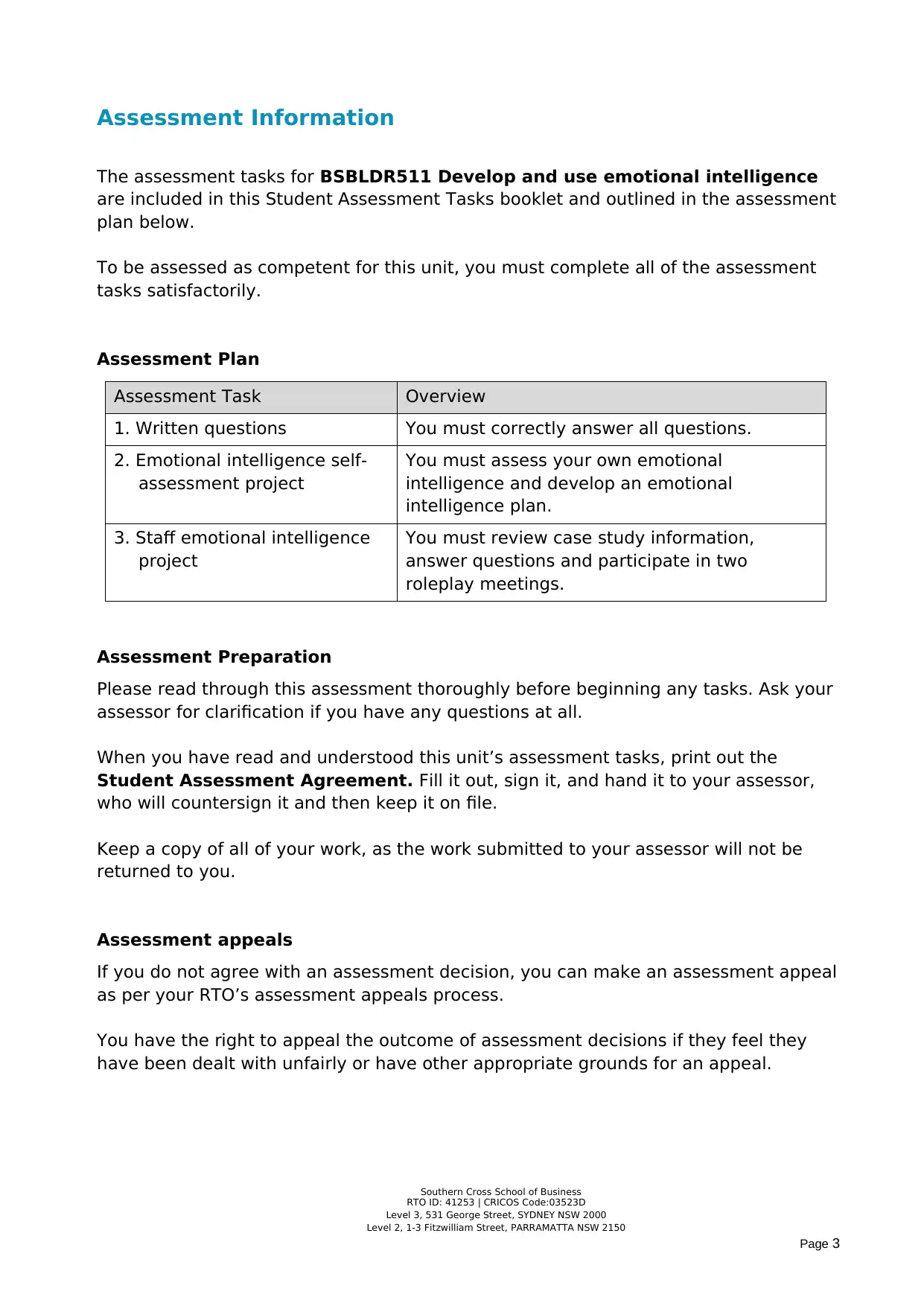
Assessment Information
The assessment tasks for BSBLDR511 Develop and use emotional intelligence
are included in this Student Assessment Tasks booklet and outlined in the assessment
plan below.
To be assessed as competent for this unit, you must complete all of the assessment
tasks satisfactorily.
Assessment Plan
Assessment Task Overview
1. Written questions You must correctly answer all questions.
2. Emotional intelligence self-
assessment project
You must assess your own emotional
intelligence and develop an emotional
intelligence plan.
3. Staff emotional intelligence
project
You must review case study information,
answer questions and participate in two
roleplay meetings.
Assessment Preparation
Please read through this assessment thoroughly before beginning any tasks. Ask your
assessor for clarification if you have any questions at all.
When you have read and understood this unit’s assessment tasks, print out the
Student Assessment Agreement. Fill it out, sign it, and hand it to your assessor,
who will countersign it and then keep it on file.
Keep a copy of all of your work, as the work submitted to your assessor will not be
returned to you.
Assessment appeals
If you do not agree with an assessment decision, you can make an assessment appeal
as per your RTO’s assessment appeals process.
You have the right to appeal the outcome of assessment decisions if they feel they
have been dealt with unfairly or have other appropriate grounds for an appeal.
Southern Cross School of Business
RTO ID: 41253 | CRICOS Code:03523D
Level 3, 531 George Street, SYDNEY NSW 2000
Level 2, 1-3 Fitzwilliam Street, PARRAMATTA NSW 2150
Page 3
The assessment tasks for BSBLDR511 Develop and use emotional intelligence
are included in this Student Assessment Tasks booklet and outlined in the assessment
plan below.
To be assessed as competent for this unit, you must complete all of the assessment
tasks satisfactorily.
Assessment Plan
Assessment Task Overview
1. Written questions You must correctly answer all questions.
2. Emotional intelligence self-
assessment project
You must assess your own emotional
intelligence and develop an emotional
intelligence plan.
3. Staff emotional intelligence
project
You must review case study information,
answer questions and participate in two
roleplay meetings.
Assessment Preparation
Please read through this assessment thoroughly before beginning any tasks. Ask your
assessor for clarification if you have any questions at all.
When you have read and understood this unit’s assessment tasks, print out the
Student Assessment Agreement. Fill it out, sign it, and hand it to your assessor,
who will countersign it and then keep it on file.
Keep a copy of all of your work, as the work submitted to your assessor will not be
returned to you.
Assessment appeals
If you do not agree with an assessment decision, you can make an assessment appeal
as per your RTO’s assessment appeals process.
You have the right to appeal the outcome of assessment decisions if they feel they
have been dealt with unfairly or have other appropriate grounds for an appeal.
Southern Cross School of Business
RTO ID: 41253 | CRICOS Code:03523D
Level 3, 531 George Street, SYDNEY NSW 2000
Level 2, 1-3 Fitzwilliam Street, PARRAMATTA NSW 2150
Page 3
⊘ This is a preview!⊘
Do you want full access?
Subscribe today to unlock all pages.

Trusted by 1+ million students worldwide
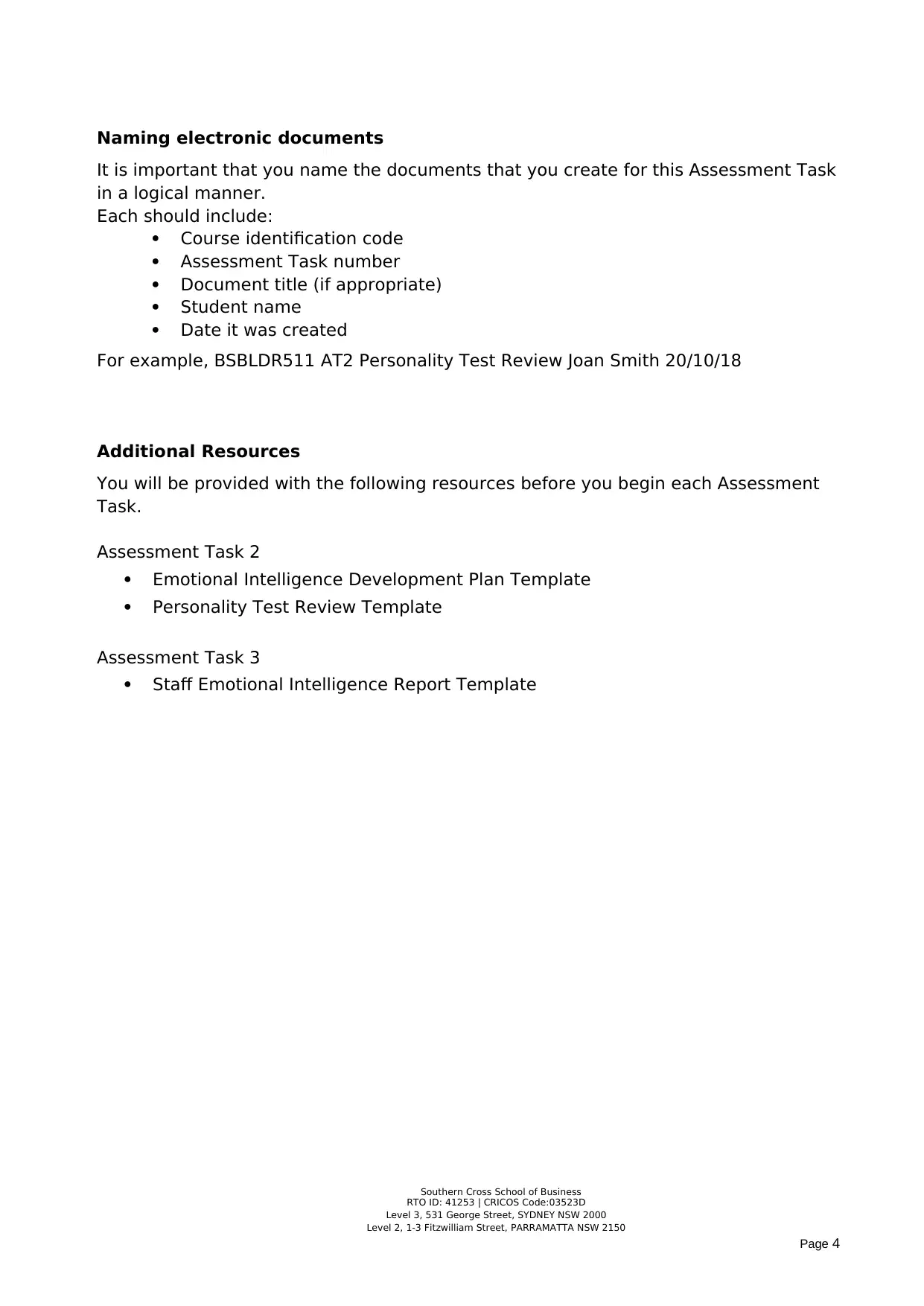
Naming electronic documents
It is important that you name the documents that you create for this Assessment Task
in a logical manner.
Each should include:
Course identification code
Assessment Task number
Document title (if appropriate)
Student name
Date it was created
For example, BSBLDR511 AT2 Personality Test Review Joan Smith 20/10/18
Additional Resources
You will be provided with the following resources before you begin each Assessment
Task.
Assessment Task 2
Emotional Intelligence Development Plan Template
Personality Test Review Template
Assessment Task 3
Staff Emotional Intelligence Report Template
Southern Cross School of Business
RTO ID: 41253 | CRICOS Code:03523D
Level 3, 531 George Street, SYDNEY NSW 2000
Level 2, 1-3 Fitzwilliam Street, PARRAMATTA NSW 2150
Page 4
It is important that you name the documents that you create for this Assessment Task
in a logical manner.
Each should include:
Course identification code
Assessment Task number
Document title (if appropriate)
Student name
Date it was created
For example, BSBLDR511 AT2 Personality Test Review Joan Smith 20/10/18
Additional Resources
You will be provided with the following resources before you begin each Assessment
Task.
Assessment Task 2
Emotional Intelligence Development Plan Template
Personality Test Review Template
Assessment Task 3
Staff Emotional Intelligence Report Template
Southern Cross School of Business
RTO ID: 41253 | CRICOS Code:03523D
Level 3, 531 George Street, SYDNEY NSW 2000
Level 2, 1-3 Fitzwilliam Street, PARRAMATTA NSW 2150
Page 4
Paraphrase This Document
Need a fresh take? Get an instant paraphrase of this document with our AI Paraphraser
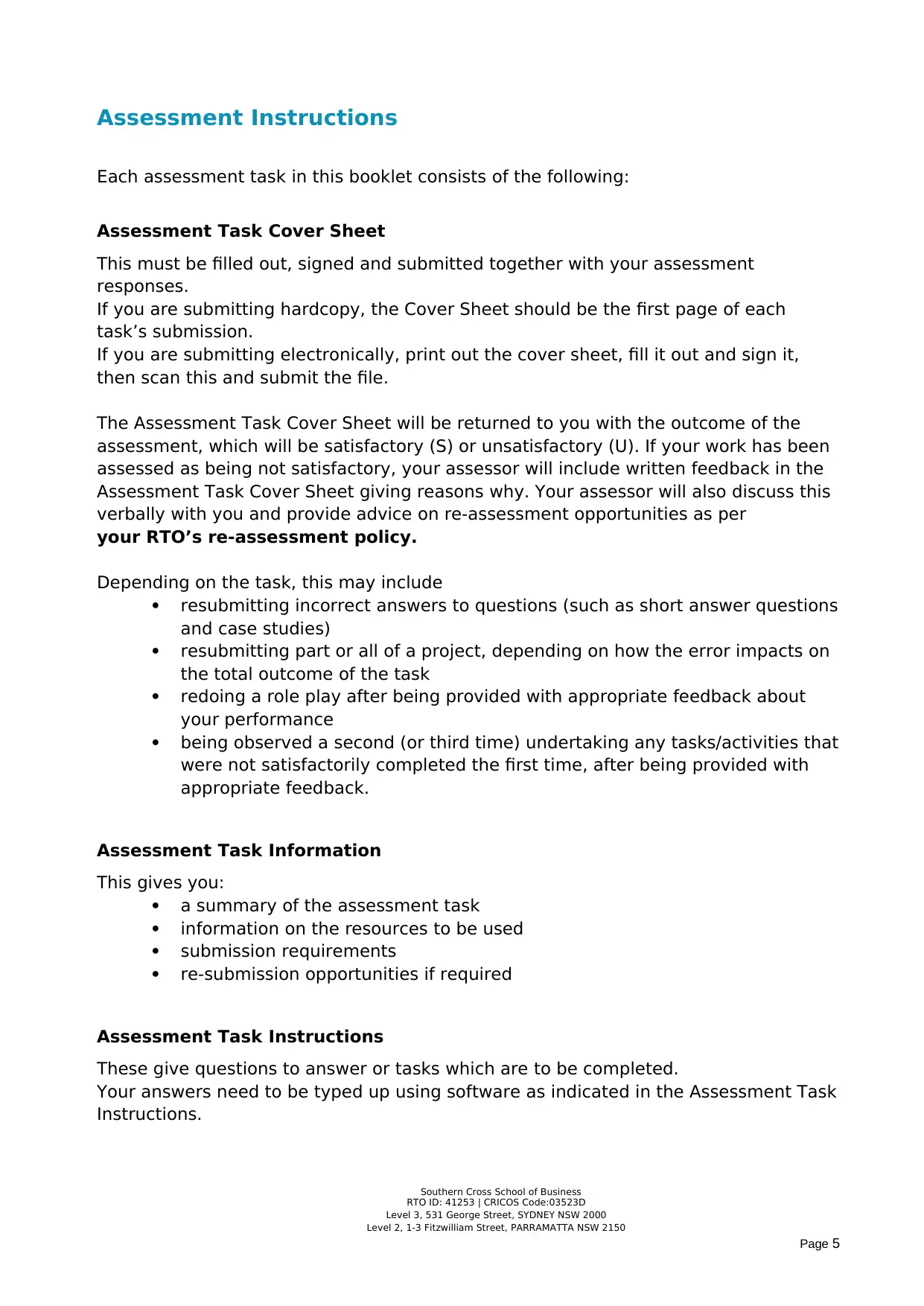
Assessment Instructions
Each assessment task in this booklet consists of the following:
Assessment Task Cover Sheet
This must be filled out, signed and submitted together with your assessment
responses.
If you are submitting hardcopy, the Cover Sheet should be the first page of each
task’s submission.
If you are submitting electronically, print out the cover sheet, fill it out and sign it,
then scan this and submit the file.
The Assessment Task Cover Sheet will be returned to you with the outcome of the
assessment, which will be satisfactory (S) or unsatisfactory (U). If your work has been
assessed as being not satisfactory, your assessor will include written feedback in the
Assessment Task Cover Sheet giving reasons why. Your assessor will also discuss this
verbally with you and provide advice on re-assessment opportunities as per
your RTO’s re-assessment policy.
Depending on the task, this may include
resubmitting incorrect answers to questions (such as short answer questions
and case studies)
resubmitting part or all of a project, depending on how the error impacts on
the total outcome of the task
redoing a role play after being provided with appropriate feedback about
your performance
being observed a second (or third time) undertaking any tasks/activities that
were not satisfactorily completed the first time, after being provided with
appropriate feedback.
Assessment Task Information
This gives you:
a summary of the assessment task
information on the resources to be used
submission requirements
re-submission opportunities if required
Assessment Task Instructions
These give questions to answer or tasks which are to be completed.
Your answers need to be typed up using software as indicated in the Assessment Task
Instructions.
Southern Cross School of Business
RTO ID: 41253 | CRICOS Code:03523D
Level 3, 531 George Street, SYDNEY NSW 2000
Level 2, 1-3 Fitzwilliam Street, PARRAMATTA NSW 2150
Page 5
Each assessment task in this booklet consists of the following:
Assessment Task Cover Sheet
This must be filled out, signed and submitted together with your assessment
responses.
If you are submitting hardcopy, the Cover Sheet should be the first page of each
task’s submission.
If you are submitting electronically, print out the cover sheet, fill it out and sign it,
then scan this and submit the file.
The Assessment Task Cover Sheet will be returned to you with the outcome of the
assessment, which will be satisfactory (S) or unsatisfactory (U). If your work has been
assessed as being not satisfactory, your assessor will include written feedback in the
Assessment Task Cover Sheet giving reasons why. Your assessor will also discuss this
verbally with you and provide advice on re-assessment opportunities as per
your RTO’s re-assessment policy.
Depending on the task, this may include
resubmitting incorrect answers to questions (such as short answer questions
and case studies)
resubmitting part or all of a project, depending on how the error impacts on
the total outcome of the task
redoing a role play after being provided with appropriate feedback about
your performance
being observed a second (or third time) undertaking any tasks/activities that
were not satisfactorily completed the first time, after being provided with
appropriate feedback.
Assessment Task Information
This gives you:
a summary of the assessment task
information on the resources to be used
submission requirements
re-submission opportunities if required
Assessment Task Instructions
These give questions to answer or tasks which are to be completed.
Your answers need to be typed up using software as indicated in the Assessment Task
Instructions.
Southern Cross School of Business
RTO ID: 41253 | CRICOS Code:03523D
Level 3, 531 George Street, SYDNEY NSW 2000
Level 2, 1-3 Fitzwilliam Street, PARRAMATTA NSW 2150
Page 5
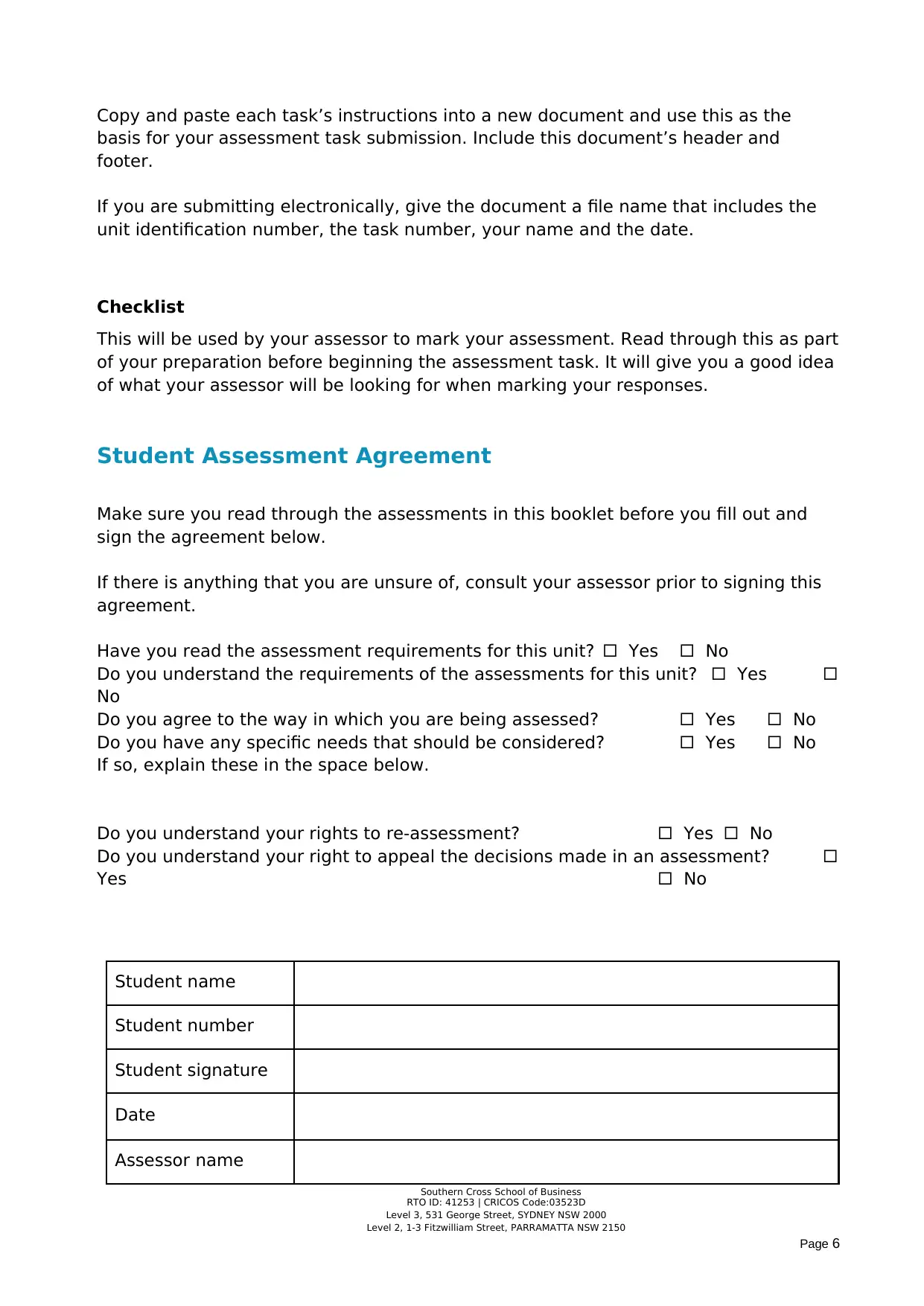
Copy and paste each task’s instructions into a new document and use this as the
basis for your assessment task submission. Include this document’s header and
footer.
If you are submitting electronically, give the document a file name that includes the
unit identification number, the task number, your name and the date.
Checklist
This will be used by your assessor to mark your assessment. Read through this as part
of your preparation before beginning the assessment task. It will give you a good idea
of what your assessor will be looking for when marking your responses.
Student Assessment Agreement
Make sure you read through the assessments in this booklet before you fill out and
sign the agreement below.
If there is anything that you are unsure of, consult your assessor prior to signing this
agreement.
Have you read the assessment requirements for this unit? Yes No
Do you understand the requirements of the assessments for this unit? Yes
No
Do you agree to the way in which you are being assessed? Yes No
Do you have any specific needs that should be considered? Yes No
If so, explain these in the space below.
Do you understand your rights to re-assessment? Yes No
Do you understand your right to appeal the decisions made in an assessment?
Yes No
Student name
Student number
Student signature
Date
Assessor name
Southern Cross School of Business
RTO ID: 41253 | CRICOS Code:03523D
Level 3, 531 George Street, SYDNEY NSW 2000
Level 2, 1-3 Fitzwilliam Street, PARRAMATTA NSW 2150
Page 6
basis for your assessment task submission. Include this document’s header and
footer.
If you are submitting electronically, give the document a file name that includes the
unit identification number, the task number, your name and the date.
Checklist
This will be used by your assessor to mark your assessment. Read through this as part
of your preparation before beginning the assessment task. It will give you a good idea
of what your assessor will be looking for when marking your responses.
Student Assessment Agreement
Make sure you read through the assessments in this booklet before you fill out and
sign the agreement below.
If there is anything that you are unsure of, consult your assessor prior to signing this
agreement.
Have you read the assessment requirements for this unit? Yes No
Do you understand the requirements of the assessments for this unit? Yes
No
Do you agree to the way in which you are being assessed? Yes No
Do you have any specific needs that should be considered? Yes No
If so, explain these in the space below.
Do you understand your rights to re-assessment? Yes No
Do you understand your right to appeal the decisions made in an assessment?
Yes No
Student name
Student number
Student signature
Date
Assessor name
Southern Cross School of Business
RTO ID: 41253 | CRICOS Code:03523D
Level 3, 531 George Street, SYDNEY NSW 2000
Level 2, 1-3 Fitzwilliam Street, PARRAMATTA NSW 2150
Page 6
⊘ This is a preview!⊘
Do you want full access?
Subscribe today to unlock all pages.

Trusted by 1+ million students worldwide
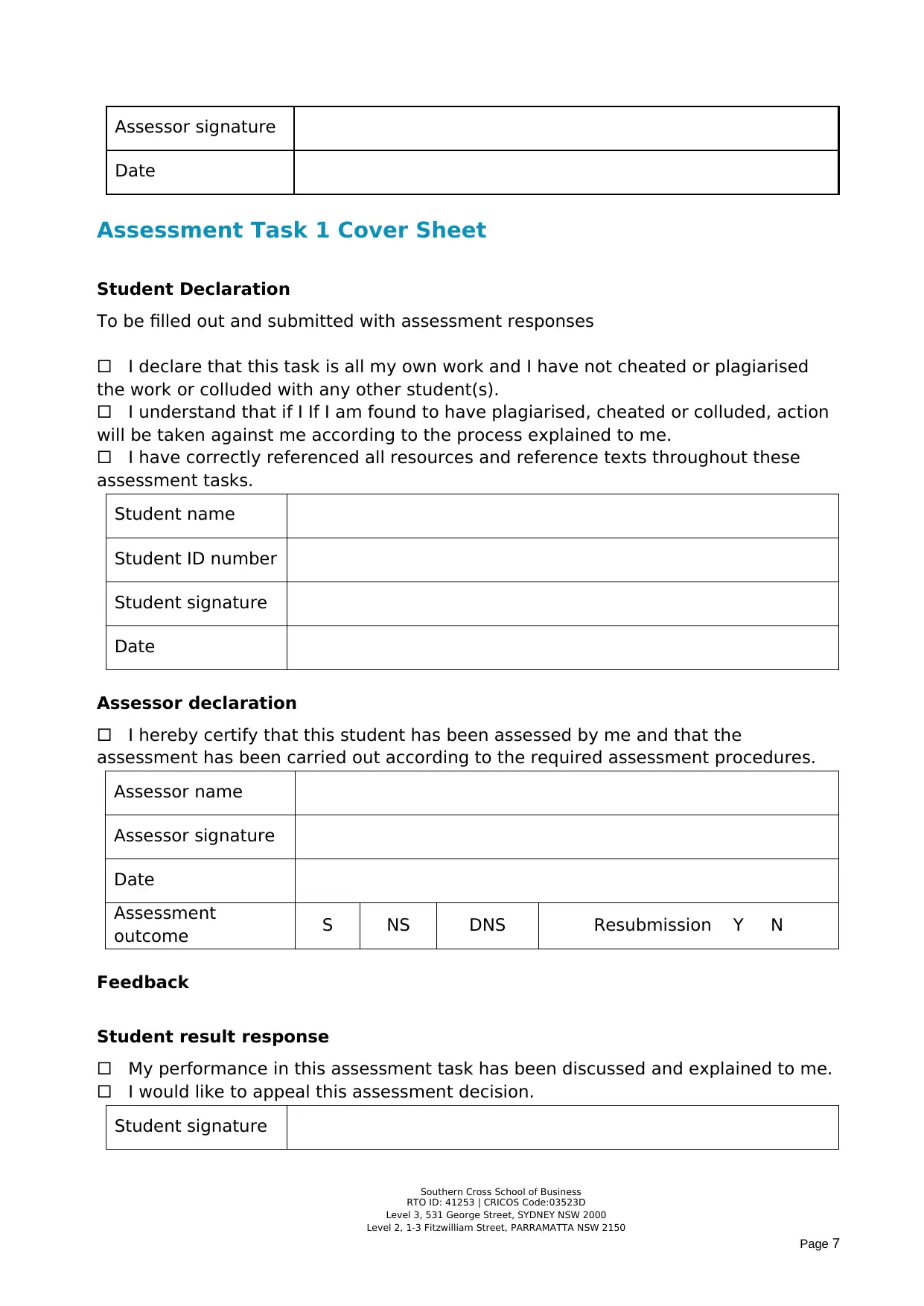
Assessor signature
Date
Assessment Task 1 Cover Sheet
Student Declaration
To be filled out and submitted with assessment responses
I declare that this task is all my own work and I have not cheated or plagiarised
the work or colluded with any other student(s).
I understand that if I If I am found to have plagiarised, cheated or colluded, action
will be taken against me according to the process explained to me.
I have correctly referenced all resources and reference texts throughout these
assessment tasks.
Student name
Student ID number
Student signature
Date
Assessor declaration
I hereby certify that this student has been assessed by me and that the
assessment has been carried out according to the required assessment procedures.
Assessor name
Assessor signature
Date
Assessment
outcome S NS DNS Resubmission Y N
Feedback
Student result response
My performance in this assessment task has been discussed and explained to me.
I would like to appeal this assessment decision.
Student signature
Southern Cross School of Business
RTO ID: 41253 | CRICOS Code:03523D
Level 3, 531 George Street, SYDNEY NSW 2000
Level 2, 1-3 Fitzwilliam Street, PARRAMATTA NSW 2150
Page 7
Date
Assessment Task 1 Cover Sheet
Student Declaration
To be filled out and submitted with assessment responses
I declare that this task is all my own work and I have not cheated or plagiarised
the work or colluded with any other student(s).
I understand that if I If I am found to have plagiarised, cheated or colluded, action
will be taken against me according to the process explained to me.
I have correctly referenced all resources and reference texts throughout these
assessment tasks.
Student name
Student ID number
Student signature
Date
Assessor declaration
I hereby certify that this student has been assessed by me and that the
assessment has been carried out according to the required assessment procedures.
Assessor name
Assessor signature
Date
Assessment
outcome S NS DNS Resubmission Y N
Feedback
Student result response
My performance in this assessment task has been discussed and explained to me.
I would like to appeal this assessment decision.
Student signature
Southern Cross School of Business
RTO ID: 41253 | CRICOS Code:03523D
Level 3, 531 George Street, SYDNEY NSW 2000
Level 2, 1-3 Fitzwilliam Street, PARRAMATTA NSW 2150
Page 7
Paraphrase This Document
Need a fresh take? Get an instant paraphrase of this document with our AI Paraphraser
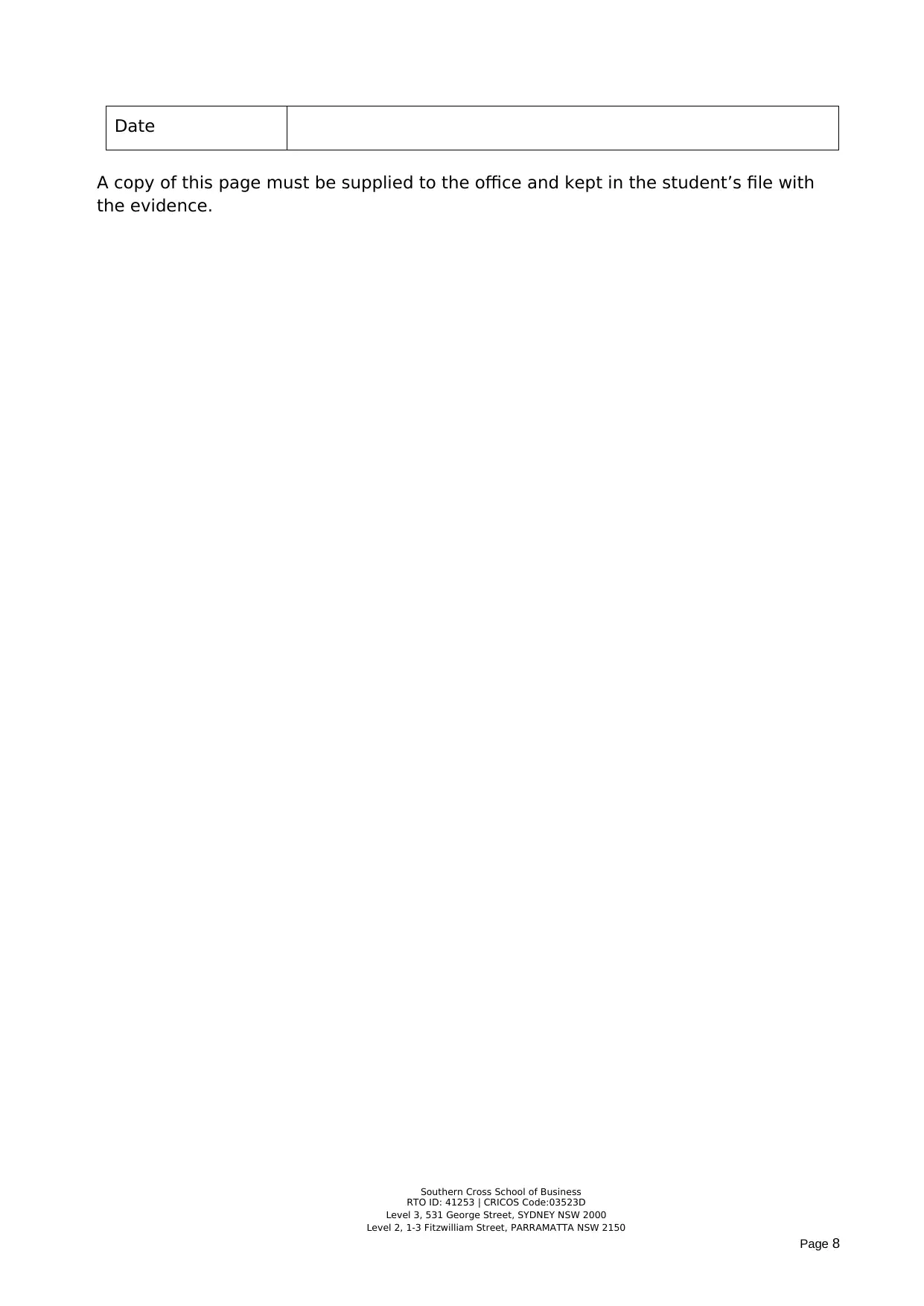
Date
A copy of this page must be supplied to the office and kept in the student’s file with
the evidence.
Southern Cross School of Business
RTO ID: 41253 | CRICOS Code:03523D
Level 3, 531 George Street, SYDNEY NSW 2000
Level 2, 1-3 Fitzwilliam Street, PARRAMATTA NSW 2150
Page 8
A copy of this page must be supplied to the office and kept in the student’s file with
the evidence.
Southern Cross School of Business
RTO ID: 41253 | CRICOS Code:03523D
Level 3, 531 George Street, SYDNEY NSW 2000
Level 2, 1-3 Fitzwilliam Street, PARRAMATTA NSW 2150
Page 8
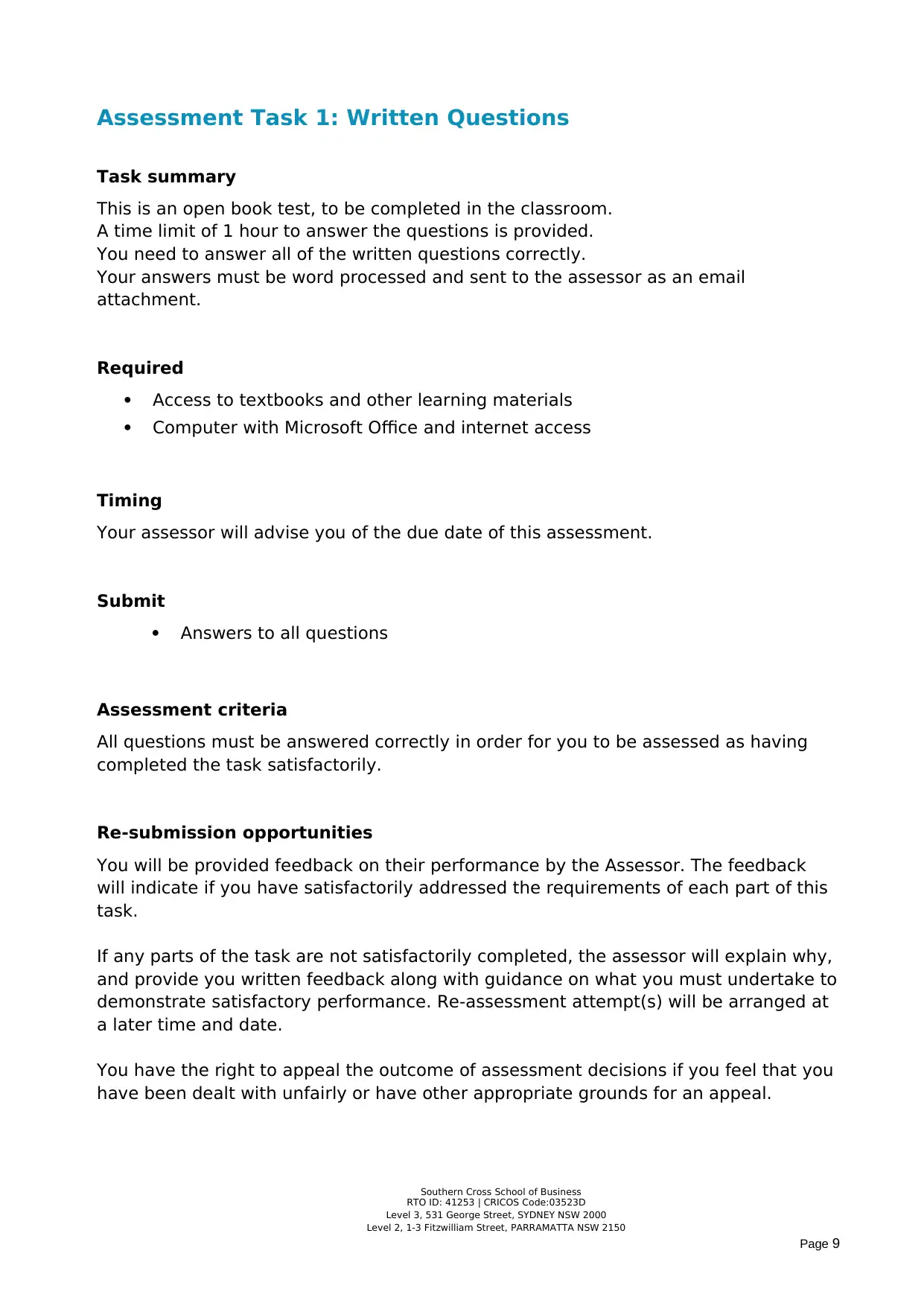
Assessment Task 1: Written Questions
Task summary
This is an open book test, to be completed in the classroom.
A time limit of 1 hour to answer the questions is provided.
You need to answer all of the written questions correctly.
Your answers must be word processed and sent to the assessor as an email
attachment.
Required
Access to textbooks and other learning materials
Computer with Microsoft Office and internet access
Timing
Your assessor will advise you of the due date of this assessment.
Submit
Answers to all questions
Assessment criteria
All questions must be answered correctly in order for you to be assessed as having
completed the task satisfactorily.
Re-submission opportunities
You will be provided feedback on their performance by the Assessor. The feedback
will indicate if you have satisfactorily addressed the requirements of each part of this
task.
If any parts of the task are not satisfactorily completed, the assessor will explain why,
and provide you written feedback along with guidance on what you must undertake to
demonstrate satisfactory performance. Re-assessment attempt(s) will be arranged at
a later time and date.
You have the right to appeal the outcome of assessment decisions if you feel that you
have been dealt with unfairly or have other appropriate grounds for an appeal.
Southern Cross School of Business
RTO ID: 41253 | CRICOS Code:03523D
Level 3, 531 George Street, SYDNEY NSW 2000
Level 2, 1-3 Fitzwilliam Street, PARRAMATTA NSW 2150
Page 9
Task summary
This is an open book test, to be completed in the classroom.
A time limit of 1 hour to answer the questions is provided.
You need to answer all of the written questions correctly.
Your answers must be word processed and sent to the assessor as an email
attachment.
Required
Access to textbooks and other learning materials
Computer with Microsoft Office and internet access
Timing
Your assessor will advise you of the due date of this assessment.
Submit
Answers to all questions
Assessment criteria
All questions must be answered correctly in order for you to be assessed as having
completed the task satisfactorily.
Re-submission opportunities
You will be provided feedback on their performance by the Assessor. The feedback
will indicate if you have satisfactorily addressed the requirements of each part of this
task.
If any parts of the task are not satisfactorily completed, the assessor will explain why,
and provide you written feedback along with guidance on what you must undertake to
demonstrate satisfactory performance. Re-assessment attempt(s) will be arranged at
a later time and date.
You have the right to appeal the outcome of assessment decisions if you feel that you
have been dealt with unfairly or have other appropriate grounds for an appeal.
Southern Cross School of Business
RTO ID: 41253 | CRICOS Code:03523D
Level 3, 531 George Street, SYDNEY NSW 2000
Level 2, 1-3 Fitzwilliam Street, PARRAMATTA NSW 2150
Page 9
⊘ This is a preview!⊘
Do you want full access?
Subscribe today to unlock all pages.

Trusted by 1+ million students worldwide

You are encouraged to consult with the assessor prior to attempting this task if you do
not understand any part of this task or if you have any learning issues or needs that
may hinder you when attempting any part of the assessment.
Southern Cross School of Business
RTO ID: 41253 | CRICOS Code:03523D
Level 3, 531 George Street, SYDNEY NSW 2000
Level 2, 1-3 Fitzwilliam Street, PARRAMATTA NSW 2150
Page 10
not understand any part of this task or if you have any learning issues or needs that
may hinder you when attempting any part of the assessment.
Southern Cross School of Business
RTO ID: 41253 | CRICOS Code:03523D
Level 3, 531 George Street, SYDNEY NSW 2000
Level 2, 1-3 Fitzwilliam Street, PARRAMATTA NSW 2150
Page 10
Paraphrase This Document
Need a fresh take? Get an instant paraphrase of this document with our AI Paraphraser
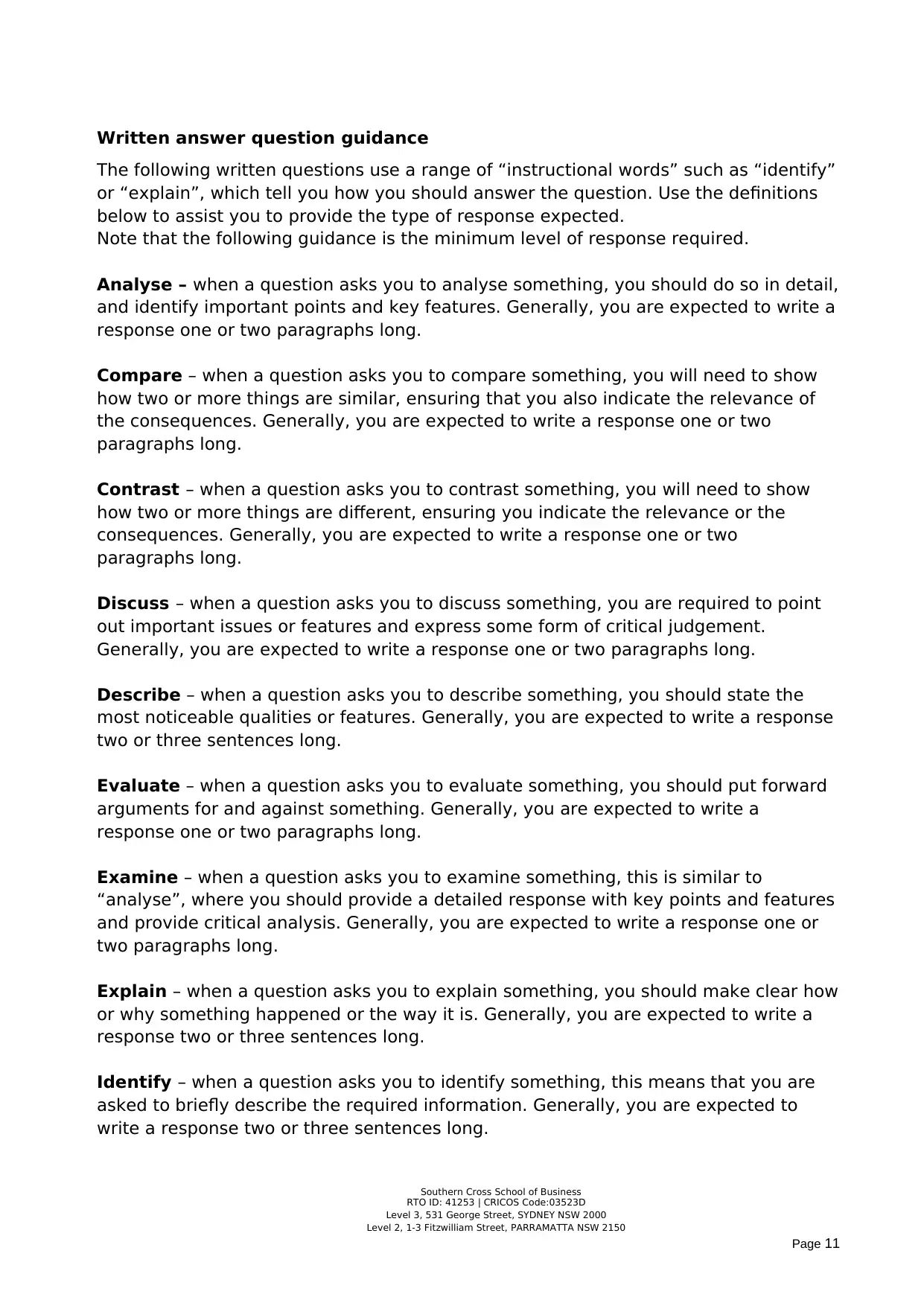
Written answer question guidance
The following written questions use a range of “instructional words” such as “identify”
or “explain”, which tell you how you should answer the question. Use the definitions
below to assist you to provide the type of response expected.
Note that the following guidance is the minimum level of response required.
Analyse – when a question asks you to analyse something, you should do so in detail,
and identify important points and key features. Generally, you are expected to write a
response one or two paragraphs long.
Compare – when a question asks you to compare something, you will need to show
how two or more things are similar, ensuring that you also indicate the relevance of
the consequences. Generally, you are expected to write a response one or two
paragraphs long.
Contrast – when a question asks you to contrast something, you will need to show
how two or more things are different, ensuring you indicate the relevance or the
consequences. Generally, you are expected to write a response one or two
paragraphs long.
Discuss – when a question asks you to discuss something, you are required to point
out important issues or features and express some form of critical judgement.
Generally, you are expected to write a response one or two paragraphs long.
Describe – when a question asks you to describe something, you should state the
most noticeable qualities or features. Generally, you are expected to write a response
two or three sentences long.
Evaluate – when a question asks you to evaluate something, you should put forward
arguments for and against something. Generally, you are expected to write a
response one or two paragraphs long.
Examine – when a question asks you to examine something, this is similar to
“analyse”, where you should provide a detailed response with key points and features
and provide critical analysis. Generally, you are expected to write a response one or
two paragraphs long.
Explain – when a question asks you to explain something, you should make clear how
or why something happened or the way it is. Generally, you are expected to write a
response two or three sentences long.
Identify – when a question asks you to identify something, this means that you are
asked to briefly describe the required information. Generally, you are expected to
write a response two or three sentences long.
Southern Cross School of Business
RTO ID: 41253 | CRICOS Code:03523D
Level 3, 531 George Street, SYDNEY NSW 2000
Level 2, 1-3 Fitzwilliam Street, PARRAMATTA NSW 2150
Page 11
The following written questions use a range of “instructional words” such as “identify”
or “explain”, which tell you how you should answer the question. Use the definitions
below to assist you to provide the type of response expected.
Note that the following guidance is the minimum level of response required.
Analyse – when a question asks you to analyse something, you should do so in detail,
and identify important points and key features. Generally, you are expected to write a
response one or two paragraphs long.
Compare – when a question asks you to compare something, you will need to show
how two or more things are similar, ensuring that you also indicate the relevance of
the consequences. Generally, you are expected to write a response one or two
paragraphs long.
Contrast – when a question asks you to contrast something, you will need to show
how two or more things are different, ensuring you indicate the relevance or the
consequences. Generally, you are expected to write a response one or two
paragraphs long.
Discuss – when a question asks you to discuss something, you are required to point
out important issues or features and express some form of critical judgement.
Generally, you are expected to write a response one or two paragraphs long.
Describe – when a question asks you to describe something, you should state the
most noticeable qualities or features. Generally, you are expected to write a response
two or three sentences long.
Evaluate – when a question asks you to evaluate something, you should put forward
arguments for and against something. Generally, you are expected to write a
response one or two paragraphs long.
Examine – when a question asks you to examine something, this is similar to
“analyse”, where you should provide a detailed response with key points and features
and provide critical analysis. Generally, you are expected to write a response one or
two paragraphs long.
Explain – when a question asks you to explain something, you should make clear how
or why something happened or the way it is. Generally, you are expected to write a
response two or three sentences long.
Identify – when a question asks you to identify something, this means that you are
asked to briefly describe the required information. Generally, you are expected to
write a response two or three sentences long.
Southern Cross School of Business
RTO ID: 41253 | CRICOS Code:03523D
Level 3, 531 George Street, SYDNEY NSW 2000
Level 2, 1-3 Fitzwilliam Street, PARRAMATTA NSW 2150
Page 11
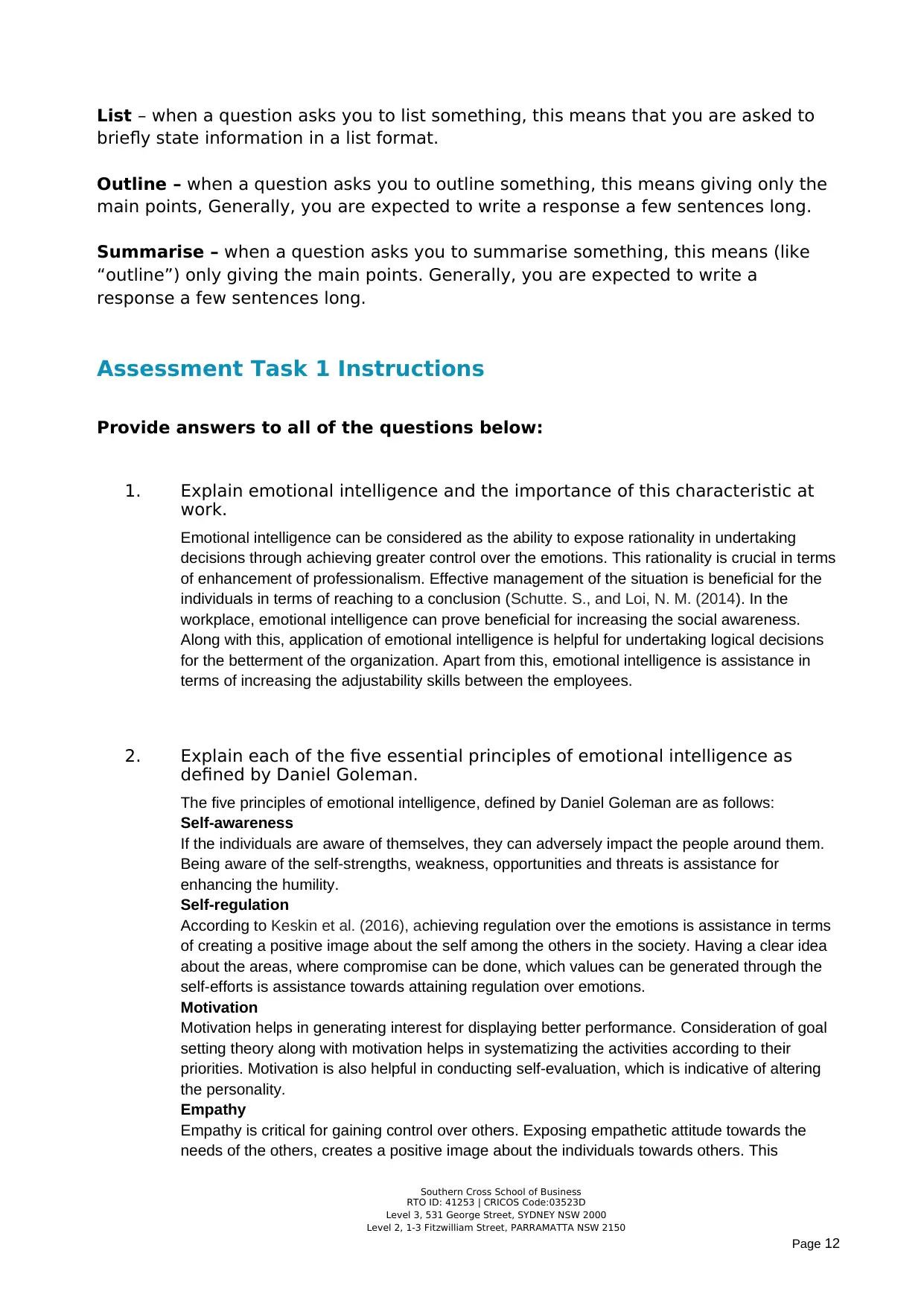
List – when a question asks you to list something, this means that you are asked to
briefly state information in a list format.
Outline – when a question asks you to outline something, this means giving only the
main points, Generally, you are expected to write a response a few sentences long.
Summarise – when a question asks you to summarise something, this means (like
“outline”) only giving the main points. Generally, you are expected to write a
response a few sentences long.
Assessment Task 1 Instructions
Provide answers to all of the questions below:
1. Explain emotional intelligence and the importance of this characteristic at
work.
Emotional intelligence can be considered as the ability to expose rationality in undertaking
decisions through achieving greater control over the emotions. This rationality is crucial in terms
of enhancement of professionalism. Effective management of the situation is beneficial for the
individuals in terms of reaching to a conclusion (Schutte. S., and Loi, N. M. (2014). In the
workplace, emotional intelligence can prove beneficial for increasing the social awareness.
Along with this, application of emotional intelligence is helpful for undertaking logical decisions
for the betterment of the organization. Apart from this, emotional intelligence is assistance in
terms of increasing the adjustability skills between the employees.
2. Explain each of the five essential principles of emotional intelligence as
defined by Daniel Goleman.
The five principles of emotional intelligence, defined by Daniel Goleman are as follows:
Self-awareness
If the individuals are aware of themselves, they can adversely impact the people around them.
Being aware of the self-strengths, weakness, opportunities and threats is assistance for
enhancing the humility.
Self-regulation
According to Keskin et al. (2016), achieving regulation over the emotions is assistance in terms
of creating a positive image about the self among the others in the society. Having a clear idea
about the areas, where compromise can be done, which values can be generated through the
self-efforts is assistance towards attaining regulation over emotions.
Motivation
Motivation helps in generating interest for displaying better performance. Consideration of goal
setting theory along with motivation helps in systematizing the activities according to their
priorities. Motivation is also helpful in conducting self-evaluation, which is indicative of altering
the personality.
Empathy
Empathy is critical for gaining control over others. Exposing empathetic attitude towards the
needs of the others, creates a positive image about the individuals towards others. This
Southern Cross School of Business
RTO ID: 41253 | CRICOS Code:03523D
Level 3, 531 George Street, SYDNEY NSW 2000
Level 2, 1-3 Fitzwilliam Street, PARRAMATTA NSW 2150
Page 12
briefly state information in a list format.
Outline – when a question asks you to outline something, this means giving only the
main points, Generally, you are expected to write a response a few sentences long.
Summarise – when a question asks you to summarise something, this means (like
“outline”) only giving the main points. Generally, you are expected to write a
response a few sentences long.
Assessment Task 1 Instructions
Provide answers to all of the questions below:
1. Explain emotional intelligence and the importance of this characteristic at
work.
Emotional intelligence can be considered as the ability to expose rationality in undertaking
decisions through achieving greater control over the emotions. This rationality is crucial in terms
of enhancement of professionalism. Effective management of the situation is beneficial for the
individuals in terms of reaching to a conclusion (Schutte. S., and Loi, N. M. (2014). In the
workplace, emotional intelligence can prove beneficial for increasing the social awareness.
Along with this, application of emotional intelligence is helpful for undertaking logical decisions
for the betterment of the organization. Apart from this, emotional intelligence is assistance in
terms of increasing the adjustability skills between the employees.
2. Explain each of the five essential principles of emotional intelligence as
defined by Daniel Goleman.
The five principles of emotional intelligence, defined by Daniel Goleman are as follows:
Self-awareness
If the individuals are aware of themselves, they can adversely impact the people around them.
Being aware of the self-strengths, weakness, opportunities and threats is assistance for
enhancing the humility.
Self-regulation
According to Keskin et al. (2016), achieving regulation over the emotions is assistance in terms
of creating a positive image about the self among the others in the society. Having a clear idea
about the areas, where compromise can be done, which values can be generated through the
self-efforts is assistance towards attaining regulation over emotions.
Motivation
Motivation helps in generating interest for displaying better performance. Consideration of goal
setting theory along with motivation helps in systematizing the activities according to their
priorities. Motivation is also helpful in conducting self-evaluation, which is indicative of altering
the personality.
Empathy
Empathy is critical for gaining control over others. Exposing empathetic attitude towards the
needs of the others, creates a positive image about the individuals towards others. This
Southern Cross School of Business
RTO ID: 41253 | CRICOS Code:03523D
Level 3, 531 George Street, SYDNEY NSW 2000
Level 2, 1-3 Fitzwilliam Street, PARRAMATTA NSW 2150
Page 12
⊘ This is a preview!⊘
Do you want full access?
Subscribe today to unlock all pages.

Trusted by 1+ million students worldwide
1 out of 46
Related Documents
Your All-in-One AI-Powered Toolkit for Academic Success.
+13062052269
info@desklib.com
Available 24*7 on WhatsApp / Email
![[object Object]](/_next/static/media/star-bottom.7253800d.svg)
Unlock your academic potential
Copyright © 2020–2025 A2Z Services. All Rights Reserved. Developed and managed by ZUCOL.




